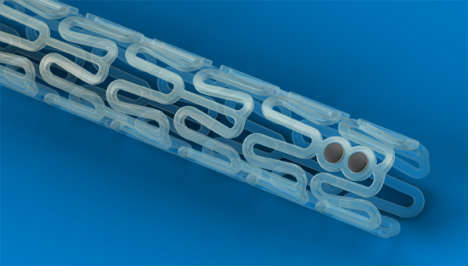Revolutionary Technology for Cardiac Patients

For the first time in Israel, at the Catheterization Institute at Rabin Medical Center, a revolutionary heart catheterization procedure was performed using soluble stents. These new stents known as Absorb open the obstruction in the coronary arteries and releases a medication called Everolimus into the artery wall in order to ensure that the artery will remain open after the procedure is complete. The innovation of the Absorb stent is that one year after implantation it begins to gradually break down into organic components and is absorbed by the artery wall. After two years, nothing is left of the stent in the body, although the artery remains open.
The revolutionary catheterization was performed as part of a clinical study at the Rabin Medical Center in which, to date, six patients were treated who were suffering from severe obstruction of the coronary arteries which supply blood to the heart muscle.
The team of catheterization cardiologists who performed the first implantations included Prof. Ran Kornowski, responsible for the clinical study and Director of the Interventional Cardiology Institute at Rabin Medical Center, Prof. Abid Assali, and Dr. Hana Vaknin-Assa.
These are the first implantations of their kind performed in Israel, and the Rabin Medical Center is one of the few medical centers in the world which has made use of this technology. The new technology is manufactured by the American company Abbott Vascular, and it is in advanced stages of research at Rabin Medical Center's Catheterization Institute and at a very small number of centers worldwide.
According to Prof. Ran Kornowski, "This is undoubtedly a significant technological revolution in the field of heart catheterization. The soluble stents are designed first of all to open arterial obstructions. But after they have performed their function they are programmed to dissolve within the human body and to disappear in a gradual process. This technology is of great importance because in this way it is possible to avoid long-term complications resulting from the presence of the stent in the body, such as the creation of blood clots and repeated obstructions."
Obstructive atherosclerosis of the coronary arteries is the principal cause of morbidity and death in the western world, including Israel. It is estimated that about half a million adults in Israel suffer from atherosclerosis, and this condition is usually treated with medication and/or by means of catheterization or coronary bypass surgery. In Israel about 40,000 heart catheterization procedures are performed each year, about 10% of them at the Rabin Medical Center.
Related Articles
New and Unique Procedure for Back Pain
Almost 1/3 of the overall world population will suffer from some type of back pain. Now for some there is an alternative to conventional surgery.
A Tomato a Day Keeps the Doctor Away
The juicy tomato, a daily feature of the Israeli diet, may be helping keep Israelis healthy.
Robots in the Operating Room at Israel’s Rabin Medical Center
Surgical robotics is an advanced technology and phenomenal in its achievements, that combines tiny instruments with a sophisticated camera attached to the surgeon’s wrist to provide 3D images in real time.